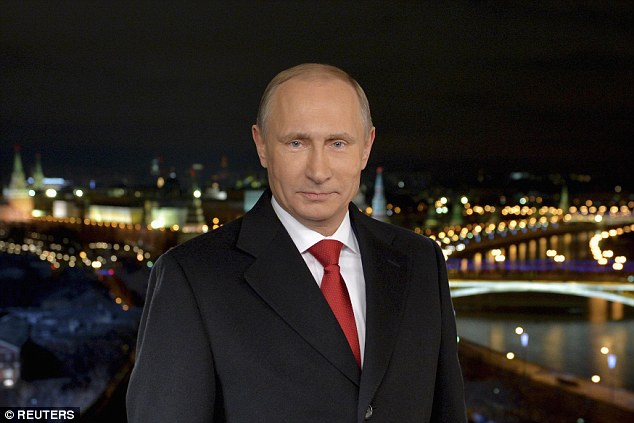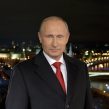
Russia Enters New Year Mired in Troubles
Publication: Eurasia Daily Monitor Volume: 12 Issue: 1
By:

The post–New Year holidays in Russia have brought less joy or happy expectations than usual to the country’s elites, the urban middle classes and even to Russia’s millions of labor migrants. Over the past 15 years, all these groups shared in the country’s prosperity, which had grown steadily since President Boris Yeltsin resigned and made Vladimir Putin his successor. The crisis of 2008–2009 delivered only a short interruption to this increase in incomes and fortunes, though the mass protests in 2012 revealed growing discontent among liberal-minded “creative classes” in Moscow. The year 2014, on the other hand, began with optimistic anticipations of success focused on the Sochi Winter Olympics. The Games were, indeed, spectacular; but the serious escalation of the Ukraine crisis immediately after the Olympics’ Closing Ceremonies swiftly and profoundly altered Russia’s trajectory. Moscow’s aggressive actions against its western neighbor brought Russia into a sharp confrontation with the West, which has evolved into the current economic disaster (Kommersant, December 26, 2014).
Russian opinion polls continue to show massive and unwavering support for Putin. But behind this “rally around the tsar,” one can discover grave personal worries and foreboding (Nezavisimaya Gazeta, December 29, 2014). The arrival of a deep economic crisis has been recognized by some 79 percent of respondents, and few expect it to be a short one. As many as 66 percent predict that 2015 will be epitomized by domestic political turmoil (Levada.ru, December 29, 2014). The sharp devaluation of the ruble against the US dollar is a serious worry for 70 percent of the respondents. While mainstream Russian experts tend to ascribe the currency’s slide to the fall in global oil prices, ordinary Russians interpret the ruble’s depreciation, which has already halved their purchasing power, as a direct consequence of Western sanctions (Levada.ru, December 30, 2014). Initially, most Russians saw these sanctions affecting only the narrow group of state elite. But by the end of the year, 62 percent of respondents confirmed that the impact was felt by the general population; while 72 percent believe that the West aims to weaken and humiliate Russia (Levada.ru, December 30, 2014).
These perceptions are too fluid to draw reliable political conclusions. Nonetheless, it is clear that the enthusiastic mobilization driven by last year’s astonishingly easy annexation of Crimea has given way to confusion. Indeed, Putin’s praise for “unity and solidarity” in his New Year’s address quite probably foretells that these qualities are going to be in a short supply (Ezhednevny Zhurnal, January 2, 2015). Confusion is definitely not limited to the audience of Russia’s propaganda-laden TV channels; the government cannot even begin to put together a meaningful anti-crisis program and merely seeks to keep the ruble from sinking further in the next couple of weeks (Forbes.ru, December 31, 2014). This can be achieved by selling about $10 billion a week from the Central Bank reserves. At the same time, however, the government has to transfer tens of billions of rubles from the National Wealth Fund to state-owned corporations and banks—so the pressure on the exchange rate will likely accumulate (Polit.ru, January 2, 2015).
In Russia, economic disarray translates directly into political meddling. And perhaps the best illustration of this phenomenon has been the latest chapter in the blatantly fraudulent court case against Alexei Navalny. In the past few years, Navalny has grown into a mature opposition leader; so in order to prevent a rally by his supporters scheduled for January 15, when the verdict was initially due to be announced, the Russian authorities rushed the proceedings. On December 30, the court handed down a surprisingly mild suspended sentence of 3.5 years (Novaya Gazeta, December 29, 2014). Nevertheless, a few thousand protesters still gathered on the Manezhnaya square. Navalny—deeply upset that his brother Oleg was given a prison sentence—came to join this small crowd, defying his house arrest status, and was swiftly detained (Moscow Echo, January 2, 2015). The Kremlin, apparently concerned about triggering an explosion of public outrage, did not dare to put Navalny behind bars; instead, he was “politely” transported home, while his brother demonstrably remains in jail (Colta.ru, December 30). A couple hundred detained protesters were also released the next morning, thus discharging tensions. Yet, the planned rally on January 15 has not been called off.
The Kremlin is maneuvering between small concessions and “soft” repressions. However, the government’s feeble control over the unfolding economic processes is aggravated by Russia’s apparent lack of a game plan for eastern Ukraine, which remains the focal point of Moscow’s complex political quandary (Lenta.ru, December 25, 2014). The ceasefire around Donetsk and Luhansk (collectively, the Donbas region) has been observed, but the situation in this rump “Novorossiya” territory is desperate and cannot be alleviated by the eleventh Russian “humanitarian convoy” that was sent there last weekend (Newsru.com, January 4, 2015). Squabbles between loot-hungry warlords are growing fierce, and an ambush on New Year’s Eve, in which the commander of one of the rebel battalions (nom-de-guerre “Batman”) was terminated, made only a minor blip on the local news (RBC.ru, January 2, 2015). Russian public opinion is tiring of this failed “patriotic mobilization” project: only 13 percent presently favor incorporating the Donbas war zone into the Russian Federation, although more than 80 percent still support the annexation of Crimea (Gazeta.ru, December 30, 2014).
Cautious back-pedaling by Moscow on the Ukraine conflict and its procrastination in controlling the economic crisis cannot prevent Russia from sinking deeper into the quagmire of troubles, which it boldly entered last spring. Putin obviously does not want to commit himself either way by making a decision. A new military offensive in Ukraine must go together with a rigid mobilization of economic resources and tough repressions against the “enemies of the people”; whereas a Russian withdrawal from the devastated “Novorossiya” could ease the economic pressure and might even be rewarded by softening the sanctions regime. The Kremlin is exploring the benefits of this second option, but cannot spin it sufficiently to avoid exposing Putin as a loser and emboldening the opposition to challenge his monopoly on power. The success of a crisis-de-escalation strategy directly depends upon advancing reforms that are unacceptable for the oligarchs and security services personnel (siloviki) beholden to him. Moreover, such a strategy depends fundamentally upon Putin’s improbable retirement. He cannot opt for such a choice, and will likely drag his feet for as long as possible before gambling on another escalatory policy. Another tumble in the ruble could make him desperate.




